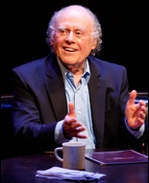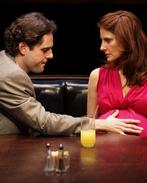SITE GUIDE
SEARCH
REVIEWS
REVIEW ARCHIVES
ADVERTISING AT CURTAINUP
FEATURES
NEWS
Etcetera and
Short Term Listings
LISTINGS
Broadway
Off-Broadway
NYC Restaurants
BOOKS and CDs
OTHER PLACES
Berkshires
London
California
New Jersey
DC
Connecticut
Philadelphia
Elsewhere
QUOTES
TKTS
PLAYWRIGHTS' ALBUMS
LETTERS TO EDITOR
FILM
LINKS
MISCELLANEOUS
Free Updates
Masthead
A CurtainUp Review
Knickerbocker
By Elyse Sommer
| What is the statue of limitation on parental responsibility? — Raymond, during the initially hostile but ultimately warmest and most touching scene with Jerry, his 40-year-old son who is not quite ready to himself be a father. |

Bob Dishyin Knickerbocker
|
The best thing about the play's New York premiere as part of the Public Theater's wonderfully affordable LAB series is that Bob Dishy is again on board for the play's best scene. If anything, he's even better now.
The rest of the 7-member cast is new to this production, as is the director and design team. The play, though strong on amusing dialogue with neat detours from the daddy subject to long standing issues between Jerry and whoever has now joined him in a booth of his favorite Manhattan eatery, the Knickerbocker Bar & Grill, remains rather shallow. What's more, director Pippin Parker, like WTF's Nicholas Martin, has not found a way to prevent the set-up that keeps Jerry (Alexander Chaplin looking much younger than 40) tethered to that restaurant booth from being rather static to watch.
Anyone attending the show at the Public's Anspacher can now head for the real Knickerbocker at nearby University Place to taste the Churros (cinnamon doughnut sticks, served with dulce de leche and chocolate sauce) discussed during one segment with his wife Pauline (Mia Barron). However, this added site specific touch does not alter the fact that Jerry's nervousness about his impending fatherhood is less about his future inability to spend as much time at the Knickerbocker than his being prepared to be a good father (which is to his credit). In fact, the question repeatedly posed to him —"Are you ready?"
would be a much more fitting title.
Since much of what had to say after my first viewing of Knickerbocker holds true for this production, my comments here are basically an updated reprise. Jerry typifies the many men who have delayed parenting and who don't just breeze into daddyhood since things like fertility tests and sonograms that take the surprise out of the baby's gender are now part of the equation. As for the to-be dad's relationship with his own dad, there is apparently no more statue of limitation on a son's unresolved issues than the parent's responsibility.

Alexander Chaplin and Mia Barron in Knickerbocker
(Photo: Carol Rosegg) |
Alexander Chaplin wrests as much emotional and humorous mileage from a man who must crack through the shell of adolescent insecurity even though he's happily married and has what his friend calls a dream job with the Guiness Book of Records. He's a cross between a Jerry Seinfeld and George Constanza who also kept returning to their favorite restaurant booth in their all about nothing sitcom. If that series had continued when Jerry Seinfeld got married and became a father (at 40+), this play would have fit right in.
Mia Barron's Pauline gets to appear in two scenes, first in her third month of pregnancy and finally in her ninth. Jerry obviously loves her and she him; in fact, she's calm and reassuring about his "I'm not ready" spoutings. Even though a former girlfriend Tara (Christina Kirk) makes an appearance, she is a steadfast friend to Pauline and the marriage overall seems reasonably problem free which makes for a rather tepid and predictable drama. This is not changed by the sequences with Melvin (a wry Ben Shenkman), a supportive friend amd Chester (Zak Orth ), the possessive and more destructive best buddy from Jerry's drug taking days.
The play does finally come to more poignant and meaningful life with the entry of Jerry's father Raymond. Bob Dishy is an actor who can make you laugh just by raising an eyebrow, and he convincingly and touchingly manages to undo years of a problematic father-son relationship. While he brings plenty of his own baggage to the table, Raymond astute enough to understand his son's neediness and give him the reassurance to deal with the scary but joyful obligation of fatherhood. This lovely, touching scene includes an exchange of memories that include Jerry's amazement that his father could have missed being part of the famous Woodstock concert or a Beatles concert (Dad's explanation: "too much traffic" in the first instance and "too many screaming girls" in the second). These comments turn into a Pinteresque moment when both men agree to "Let It Be, " the title of the Beatles' last album about leaving problems behind and moving on. The father-son epiphany carries over to Jerry's final scene with his wife.
Peter Ksander's unit set features a backwall of posters, on one of which announcements of Jerry's next dinner companion are projected. Keeping Jerry planted in the restaurant booth strikes me as the playwright's equivalent of a parental Time Out until a child has learned to change unacceptable behavior. As each forward move in time brings someone else to share his table, we become more familiar with the whys and wherefores of Jerry's unreadiness for this major event in his life. Of course, while the naughty child can't wait to leave his room, Jerry hangs on to the place symbolizing his unencumbered by babies life. I'm hardly a spoiler when I tell you that by the time the lights go down, he will be ready to leave the Knickerbocker restaurant and do so with a bit less of the forty years of accummulated emotional baggage.
The New York production is ten minutes shorter than the one I first saw because a scene early on in that production has been excised. It was the only one that had Jerry leave the restaurant booth and relate the true story of one of the amazing people profiled in The Guinness Book of Records. That man, Roy Sullivan, amazingly lived thrugh seven lightning strikes and killed himself at age seventy because of an unhappy love affair. According to the WTF program notes, this is what set Sherman to thinking about the choices and happenstance of our lives generally and Jerry's specifically. Given that this was even more of a stretch than much of what else passes for plot in this play, omitting this is no loss. The story, now as then, had me wishing for lightning to strike and give some of that excessively slick talk the warmth of the father and son scene.
Other Jonathan Marc Sherman plays reviewed at Curtainup
Sophistry(2009)
Evolution-Berkshires
Evolution/-Off-Broadway
Things We Want
|
Knickerbocker byJonathan Marc Sherman Drected by Pippin Parker Cast: Mia Barron (Pauline), Alexander Chaplin (Jerry), Bob Dishy (Raymond), Christina Kirk (Tara), Drew Madland (Steve), Zak Orth (Chester), and Ben Shenkman (Melvin) Scenic design: Peter Ksander Costume design: Gabriel Berry Lighting design: Jeff Croiter Projection design: Shawn Duan Original music: Mark Parenti Stage Manager: Pamela Salling Running time is 85 minutes, no intermission Public LAB production at the Public Theater 420 Lafayette Street From 5/15/11; opening 5/19/11; closing 5/29/11 Reviewed by Elyse Sommer 5/15/11 |
|
REVIEW FEEDBACK Highlight one of the responses below and click "copy" or"CTRL+C"
Paste the highlighted text into the subject line (CTRL+ V): Feel free to add detailed comments in the body of the email. . .also the names and emails of any friends to whom you'd like us to forward a copy of this review. Visit Curtainup's Blog Annex For a feed to reviews and features as they are posted add http://curtainupnewlinks.blogspot.com to your reader Curtainup at Facebook . . . Curtainup at Twitter Subscribe to our FREE email updates: E-mail: esommer@curtainup.comesommer@curtainup.com put SUBSCRIBE CURTAINUP EMAIL UPDATE in the subject line and your full name and email address in the body of the message. If you can spare a minute, tell us how you came to CurtainUp and from what part of the country. |

Slings & Arrows-the complete set
You don't have to be a Shakespeare aficionado to love all 21 episodes of this hilarious and moving Canadian TV series about a fictional Shakespeare Company




